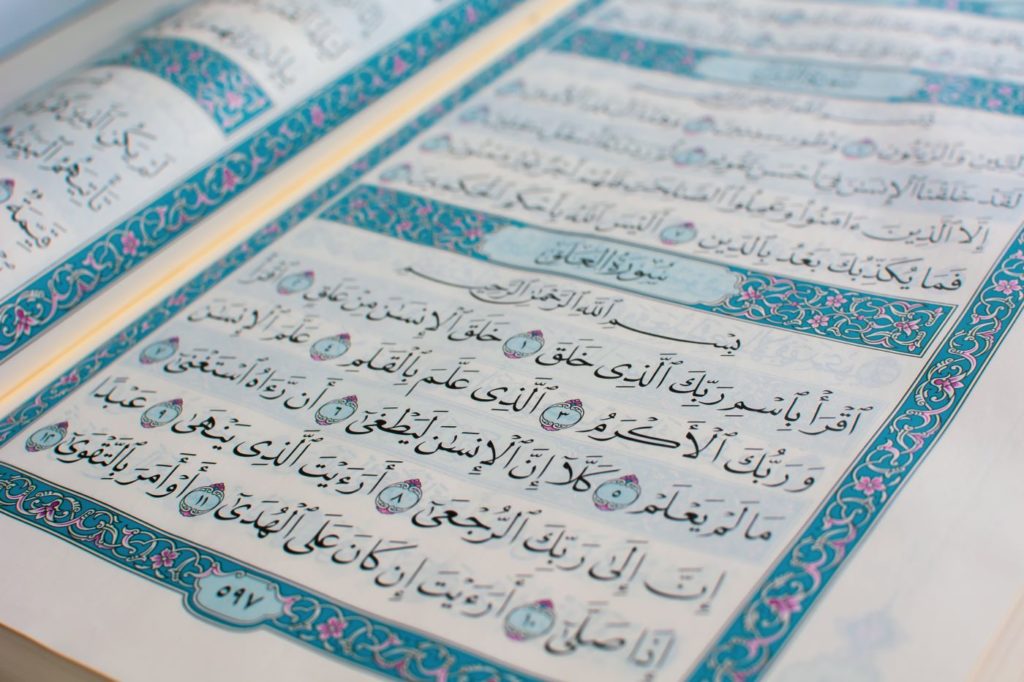Questions of sex, sexual orientation, and transgender status are at the center of a group of cases before the US Supreme Court this term. These cases, such as Harris v. EEOC, have generated much interest, and many amicus briefs have been submitted on various sides of the cases. American Muslims have submitted three amicus briefs about these cases.
The contrast among the briefs submitted by American Muslims could not be starker. Two of the amicus briefs are religious; these argue from traditional Islamic teachings against the modernist notions of sexual preference and gender identity. For example, the amicus brief submitted by the Islam and Religious Freedom Action Team of the Religious Freedom Institute (RFI) along with allied Muslim scholars, argues that “sex is binary, fixed and immutable.” In contrast, the authors of the non-religious third amicus brief embrace and defend LGBT causes, and maintain that gender identity is, even more than religious belief, a serious, “sincerely held belief” deserving legal protection. The diverging amicus briefs reveal a disagreement about religion—is it primarily just another identity group or is it primarily a community centered on truth claims?
The Traditional Approach
The RFI Islam Team, led by Ismail Royer, submitted one of the religious briefs along with American Muslim scholars Abdullah Bin Hamid Ali and Shaykh Mohammad Amin Kholwadia. They present arguments from their religion for why the Supreme Court should abide by the plain meaning of the word “sex” in Title VII and not redefine this to include sexual orientation or transgender status. They explain why replacing “sex” with “gender identity” in law would place a distinctive and significant burden on Muslims and other religious believers.
Start your day with Public Discourse
Sign up and get our daily essays sent straight to your inbox.The authors of this brief present their concerns as Muslims. Yet they also emphasize that many of the adverse impacts that they identify for Muslims would also affect believers of other religions in America. They explain that not only do they believe “God created human beings, male and female” but that the “redefinition of ‘sex’ to include sexual orientation and transgender status will revolutionize the workplace to the detriment of people of faith, including millions of Muslim Americans.” If Muslims were to go along with such a change, they would, the brief argues, be compelled to engage in the “contradiction of their religious conviction” or face the alternative of having to leave “the business or vocation to which they feel called.” Their brief explains how Islam obliges Muslims not to be in an enclosed space, such as a bathroom, with a person of the opposite sex who is neither a spouse nor a close blood relative. This religious obligation would make it nearly impossible for a devout Muslim to follow his or her faith and to work or go to school at an institution where replacing the concept of sex with gender identity results in the elimination of single-sex bathrooms.
Christians in America have raised objections to “gender inclusive bathrooms” based on concerns about privacy and safety, since abolishing clear rules about who may enter a bathroom makes it easy for those who seek the sexual harm of others to abuse this ambiguity. What is distinctive about the arguments these Muslims are making against shared bathrooms is that such a fundamental and profound reorganization of society would essentially leave them with a choice of denying their faith or being banished from participating in public life.
The RFI Islam Team brief explains that the effort to restructure all of society around “gender identity” instead of sex, male and female, is for Muslims not a question of accepting or rejecting people who identify as something other than their bodily sex. It is instead a question of Muslims’ “religious obligations, rights, and responsibilities” because “a Muslim’s obligation to recognize the biological distinctives of males and females does not change because an individual chooses to identify as a gender different from their biological sex.”
“A Muslim’s obligation to recognize the biological distinctives of males and females does not change because an individual chooses to identify as a gender different from their biological sex.”
Disregard for biology is not something these Muslims view as an option. “Islamic jurisprudence,” they explain,” teaches that a person’s sex cannot change.” They note that “God’s creation of male and female is determined by biology, by genitalia and by genetics, related to conjugal union and reproduction.” They explain that no change in “the body’s features, dressing differently, or requesting to be addressed by a different pronoun” changes Islam’s recognition of the sex of a person in that person’s biological reality, in which sex is determined at conception and is present down to the cellular level in the body.
Similarly, in a 2017 fatwa (legal opinion) on transgenderism, Muslim jurists from the American Fiqh (Islamic jurisprudence) Academy make essentially the same argument. They rule that since “neither Sex Reassignment Surgery nor hormone therapy results in a genuine transformation from one sex to another, even if it results in some physical changes, . . . [t]he results of such procedures extend only to apparent resemblance of the opposite sex, not a conversion into it.”
They moreover view this not as a matter of identity preference, but rather as a question of sin: “These procedures fall under the prohibition of changing the creation of Allah, . . . which the Quran explicitly identifies as a tool of Shayṭān” (Satan). Both the RFI Islam Team’s amicus brief and this fatwa explain why Muslims view such elective changes in identity as fundamentally different from the rare biological occurrence of disorders of sexual development (colloquially referred to as intersexuality).
A second religious amicus brief was submitted by the Muslim American Leaders, a coalition of Sunni Muslim religious and business leaders. Their central concern is that redefining sex under Title VII to include sexual orientation and gender identity would “create a moral conflict upon amici’s constitutionally protected Free Exercise.”
This brief is very direct: “Muslim Americans Are Compelled by their Beliefs to Oppose the Practice of Intercourse with People of the Same Sex as an Evil.” They continue, “The Quran clearly describes the practice of engaging in sexual relations with people of the same sex as an abomination.” As a result, they argue, “Muslim Americans have a responsibility to forbid people from committing sin and to refuse to cooperate in support of it.”
Intersectionality’s Higher Esteem for Transgenderism Than for Faith
A third amicus brief submitted by the Muslim Bar Association of New York (MuBANY), plus eleven other organizations, all of which have the word “Islam” or “Muslim” in their name, supports the EEOC’s claim that “sex” in Title VII should be expanded to include “sexual preference” and “gender identity.” (A list of these organizations is below.) Their approach is based on identity politics and intersectionality. The only mention of religion in their brief is that it is, for them, a group identity, and for them, having a group identity leads them to defend the group identities of others. They explain, “As people of faith, amici are compelled to advocate for the rights of marginalized and disfavored groups in our society.”
In this intersectional framework, “disfavored” minorities are interchangeable. The nature of the minority does not matter. MuBANY et al. argue, “Like LGBT individuals, Muslims in the United States disproportionately face workplace discrimination, limiting their job opportunities and chances at advancement.” What matters is only that the group in question be “disfavored” and a “minority.”
MuBANY et al. state this point repeatedly. “Amici are American-Muslim organizations, whose members are people of faith acutely conscious of the challenges that disfavored minorities face in the workplace. . . Amici thus have an interest in vibrant workplace protections for all disfavored groups. . .” Later in their brief they state that “Amici Muslim Organizations Advocate for Broad Workplace Protections for All Marginalized and Disfavored Groups.” A third time, they insist, “The need to reinforce Title VII protections for all marginalized groups—including LGBT and Muslim individuals—is more important than ever.” [Emphases added.]
Note the use of the word “all,” not just once, but three times. This intersectional argument is that each “disfavored,” “marginalized” minority group must support every other “disfavored,” “marginalized” minority group simply because they are “disfavored minorities.” Neither individual rights nor judgments about the truth of the claims of minority groups have a role to play. Intersectionality assumes “disfavored,” “marginalized” minorities deserve more rights than majority groups. By this logic, if pedophiles were to assert that they should be classified as a protected category under the law, then, because they are a “disfavored minority,” we should expect to see MuBANY et al. rushing to their defense.
A hierarchy of values does, however, enter the MuBANY brief when they treat gender identity as more serious and objective than religious faith. They reject the argument of their opponents that gender identity has a “purportedly ‘subjective’ nature.” Note their use of scare quotes around “subjective.” In the view of MuBANY et al., what really is subjective is religious belief, which they claim is only “ultimately grounded in one’s internal experience.”
Promoting Harms to Muslims
The RFI Islam Team and allied scholars lambaste this comparison between gender identity and religious faith:
Amici RFI, et al., find this comparison deeply flawed, false and repugnant to the Islamic understanding of religion. An individual’s discomfort or dysphoria regarding his or her sex, and belief that it can be changed, has nothing whatsoever in common with an individual’s search for divine truth and God’s pleasure. Discovering revealed truth about God and pleasing Him have no comparison with a person’s acting on desires, impulses, preferences or orientation regarding sexual conduct.
One of the most likely outcomes, if sexual orientation and gender identity become protected classes under the law (as the groups in the MuBANY brief want), will be a structural disadvantage in US law for devout Muslims and others with traditional religious beliefs. The MuBANY brief tries to skirt around this, instead asserting that “fortifying protections for LGBT individuals in the workplace promotes more equal treatment for all.”
> One of the most likely outcomes if sexual orientation and gender identity become protected classes under the law, as the groups in the MuBANY brief want, will be a structural disadvantage in US law for devout Muslims and others with traditional religious beliefs.
The Muslim American Leaders label this claim “false.” They argue, “if this Court adopts the position of Plaintiffs and their supporters such as MuBANY, it would create an unjust moral crisis for millions of employers and supervisors who[se] deeply held religious beliefs compel them to oppose Plaintiffs’ lifestyle choices.” The RFI Islam Team warns:
If “sex” in the 1964 Civil Rights Act is interpreted to include transgender status, then a Muslim-run business, school, or organization that has multi-stall sex-specific bathrooms will be required to allow men claiming to be women to use the women’s bathroom. This dramatic change in legal obligations will demand violation of religious conscience, cessation of business, or new accommodations that will cause an undue burden on religious employers and their Muslim employees.
It is astonishing that the Islamic Society of Basking Ridge, New Jersey supports the MuBANY brief. In 2016 this mosque used US law to argue successfully in court for religious freedom for themselves to build a mosque; multiple religious groups supported them in this effort. But now, after success at benefiting themselves, the Islamic Society of Basking Ridge has turned around and is arguing against religious freedom for other religious believers to exercise their faith without government coercion in internal affairs, such as being able to abide by the recognition of human sex, i.e. male and female. Using religious freedom law for their own benefit but then undermining religious freedom for others is hypocrisy.
LGBT Lobby Is Not Offering Muslims Mutual Tolerance
At the online journal Muslim Matters, Ahmed Shaikh tried to argue that the Muslim organizations that signed onto the MuBANY brief were “duped” into doing so. I see zero evidence that any of the twelve groups supporting the MuBANY brief were “duped.” The organizations signing the MuBANY brief had abundant information about the nature of those promoting the brief.
The Counsel of Record on the brief is Adeel Mangi, who serves on the Board of Directors of the National LGBT Bar Association. This is public information. The supporting organizations include Soros-funded groups long involved in LGBT advocacy under the labels of “Islam” and “Muslim.” This too is public information. These include Muslims for Progressive Values (MPV). MPV’s website features a photo of its founder, Ani Zonneveld, a woman, officiating at a wedding between two women. The nature of MPV is well known to American Muslims. Shaykh characterizes MPV as “hostile to the religion of Islam itself.” He says “It would be charitable to the point of fraud to characterize MPV as a Muslim organization. That MPV has dedicated itself to promoting ignorance of the religion within the Muslim community is not in serious dispute.” The organizations that joined the MuBANY brief bear full responsibility for their choice to support this brief.
The LGBT lobby is not offering Muslims a two-way “tolerate us and we’ll tolerate you” deal. Watch this seventy-two-second video from October 9, the day of the oral arguments in these cases. On the steps of the Supreme Court, American Muslim Ismail Royer spoke out for religious freedom. LGBT activists tried to silence Royer. They shouted, some using megaphones, to try to drown out Royer as he spoke, and one waved an LGBT rainbow flag to try to distract him. The more power the LGBT lobby gains, with the help of MuBANY et al., the more Muslims will face this type of treatment.
Democratic presidential candidate and former congressman Beto O’Rourke recently spelled this out in detail. In response to the question “Do you think religious institutions like colleges, churches, charities, should they lose their tax-exempt status if they oppose same-sex marriage?” O’Rourke responded quickly and assertively, “Yes.” A few days later when asked if he really meant he would revoke the tax exempt status of “conservative black churches, mosques, Islamic organizations, Orthodox Jewish communities, a number of religiously affiliated HBCU” (historically black colleges and universities) he affirmed that yes, he would—for example for religiously run “higher education or health care or adoption services.” In essence, MuBANY et al. are supporting the legal perspective that the US government should revoke the tax-exempt status of Muslim institutions such as America’s first Muslim liberal arts institution, Zaytuna College, the Salem Free Clinic providing free health care to the poor in rural Alabama, and the Muslim Foster Care Association, if such institutions abide by their Muslim faith.
The stark divergence among these briefs provides a reminder that American Muslims are internally diverse. Anyone who thinks Muslims in America form a solid, united, coordinated block conspiring efficiently and effectively to make sharia the law of the land is not following the actual complicated, messy dynamics of intra-Muslim politics in America.
More importantly, the side that poses the gravest threat to the American way of life is that with the essentially secular approach of the MuBANY et al. groups. Their privileging of LGBT claims is leading to relegating Americans with traditional religious beliefs—including religious Muslims—to be second-class citizens, or worse. In contrast, the pious Muslims who are trying to defend religious freedom and family values in America are our allies.
********
The twelve organizations supporting the MuBANY brief, i.e. opposing religious freedom protection on issues of sexual orientation and gender identity, are: The Muslim Bar Association of New York, Capital Area Muslim Bar Association, Council on American-Islamic Relations (CAIR)-Oklahoma Chapter, Dallas Fort Worth Muslim Bar Association, Islamic Society of Basking Ridge, Muslim Advocates, Muslim Caucus of America, Muslim Public Affairs Council, Muslim Urban Professionals, Muslims for Progressive Values, New England Muslim Bar Association, and New Jersey Muslim Lawyers Association.














